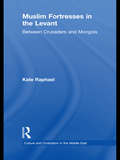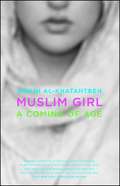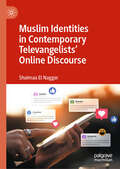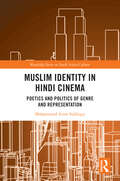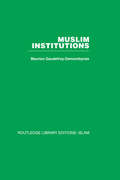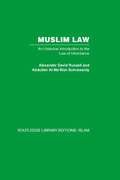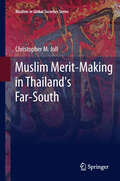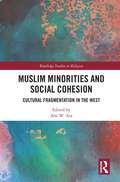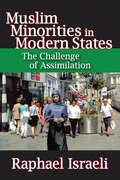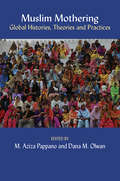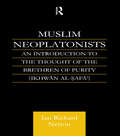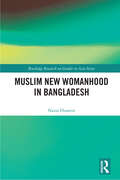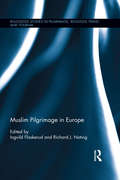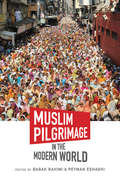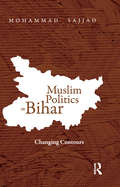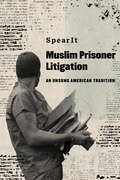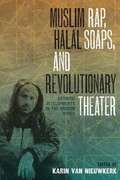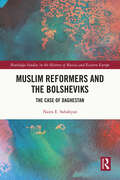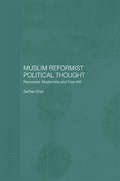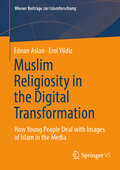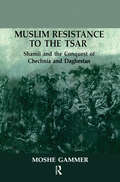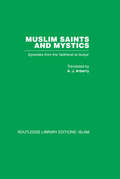- Table View
- List View
Muslim Fortresses in the Levant: Between Crusaders and Mongols (Culture and Civilization in the Middle East)
by Kate RaphaelDuring much of the twelfth century the Crusaders dominated the military scene in the Levant. The unification of Egypt and Syria by Saladin gradually changed the balance of power, which slowly begun to tilt in favour of the Muslims. This book examines the development and role of Muslim fortresses in the Levant at the time of the Crusaders and the Mongol invasion, situating the study within a broad historical, political and military context. Exploring the unification of Egypt with a large part of Syria and its effect on the balance of power in the region, Raphael gives a historical overview of the resulting military strategies and construction of fortresses. A detailed architectural analysis is based on a survey of four Ayyubid and eight Mamluk fortresses situated in what are today the modern states of Jordan, Israel, Southern Turkey and Egypt (the Sinai Peninsula). The author then explores the connection between strongholds or military architecture, and the development of siege warfare and technology, and examines the influence of architecture and methods of rule on the concept of defence and the development of fortifications. Drawing upon excavation reports, field surveys and contemporary Arabic sources, the book provides the Arabic architectural terminology and touches on the difficulties of reading the sources. Detailed maps of the fortresses in the region, the Mongol invasion routs, plans of sites and photographs assist the reader throughout the book, providing an important addition to existing literature in the areas of Medieval Archaeology, Medieval military history and Middle Eastern studies.
Muslim Girl: A Coming of Age
by Amani Al-KhatahtbehRequired reading from the founder of MuslimGirl.com--a harrowing and candid memoir about coming of age as a Muslim American in the wake of 9/11, during the never-ending war on terror, and through the Trump era of casual racism.At nine years old, Amani Al-Khatahtbeh watched from her home in New Jersey as two planes crashed into the World Trade Center on September 11, 2001. That same year, she heard her first racial slur. At age eleven, when the United States had begun to invade Iraq and the television was flooded with anti-Muslim commentary, Amani felt overwhelmed with feelings of intense alienation from American society. At thirteen, her family took a trip to her father's native homeland of Jordan, and Amani experienced firsthand a culture built on pure religion, not Islamic stereotypes. Inspired by her trip and after years of feeling like her voice as a Muslim woman was marginalized and neglected during a time when all the media could talk about was, ironically, Muslim women, Amani created a website called MuslimGirl. As the editor-in-chief, she put together a team of Muslim women and started a life dedicated to activism. This is the extraordinary account of Amani's journey through adolescence as a Muslim girl, from the Islamophobia she's faced on a daily basis, to the website she launched that became a cultural phenomenon, to the nation's political climate in the 2016 election cycle with Donald Trump as the Republican nominee. While dispelling the myth that a headscarf makes you a walking target for terrorism, she shares both her own personal accounts and anecdotes from the "sisterhood" of writers that serve as her editorial team at MuslimGirl. Amani's honest, urgent message is fresh, timely, and a deeply necessary counterpoint to the current rhetoric about the Middle East.
Muslim Identities in Contemporary Televangelists' Online Discourse
by Shaimaa El NaggarThis book examines the discourse of Muslim televangelism in the West, particularly looking at the emergence of 'home-grown' televangelists who grew up in the West and deliver their sermons in English, addressing audiences in contexts such as the UK and the USA. In their sermons, televangelists address topics that are relevant to the everyday life of Muslims and Muslim youth such as friendship, marriage and the misrepresentation of Islam/Muslims in mass media. This book explores contemporary Muslim televangelism and its manifestations in other forms of digital religion, including YouTube, websites and social media which mediate religious content. Using a Critical Discourse Studies approach, the author explores the power structures underpinning the popularity of Muslim televangelism, investigates the linguistic strategies used by Muslim televangelists to construct their identities online, and analyses how Islam and Muslims are represented in their sermons. This book will be of interest to religious studies, media studies, and discourse studies scholars, and to anyone interested in the topic of Islam/Muslims in the West in the contemporary age.
Muslim Identity in Hindi Cinema: Poetics and Politics of Genre and Representation (Routledge Series on South Asian Culture)
by Mohammad Asim SiddiquiThis book examines the representation of Muslim identity in Hindi films by focusing on different aspects of Muslim identity - historical, cultural, and linguistic - and their realisation in cinematic form.The book assesses the changing perceptions of Muslim identity, beginning from the historical films of the 1940s to the more recent films which often address the current stereotypical notions of Muslim identity in the post-9/11 world and in particular, analyses films which treat the problematic of "global Muslim identity". It argues that genre, language, and various sign systems create understandings and mediate notions of identity. Offering a close reading of films belonging to different genres - Muslim social, action thriller, gangster, biopic, and many others - the book interrogates concepts of social diversity, tokenism, marginality, and their reflection and consolidation in Hindi films. It critically looks at the representation of Muslim women characters and the politics of interfaith romances in many films. The book also reads many films which probe Partition violence, communal riots and the international discourse on terror. It also touches on the evolution of the language of Hindi films and its role in creating a lingua franca uniting diverse and variegated groups of people in India. Drawing insights from new critical close reading, deconstruction, semiotic and discourse analysis, the book also offers a close reading of a few films in each chapter, which offer important insights into Hindi cinema.This book offers a unique and comprehensive analysis of the political and representational aspects of Hindi cinema, portrayal of Muslims in popular arts, and the debates and politics over the use of Hindustani in India and its identification with religious and communitarian identity. It will be of interest to researchers studying world cinema, Hindi cinema, sociology and Asian studies.
Muslim Institutions
by Maurice Gaudefroy-DemombynesOriginally published in 1967, this Companion is designed to help readers of the Qur’an by giving them necessary background information. An account is given of ideas peculiar to the Qur’an, and the main variant interpretations are noted. A full index of Qur’anic proper names and an index of words commented on has been provided. Based on A J Arberry’s translation, this Companion can be used with other translations, or indeed with the original text, since the verses are numbered.
Muslim Law: An Historical Introduction to the Law of Inheritance
by Alexander David RussellThis volume, orginally published in 1925, outlines the historical development of the Muslim law of inheritance in pre-Islamic Law. It discusses the ranking of heirs and guardians, reforms introduced by Muhammad, subsequent development of the law, and rise of the orthodox schools.
Muslim Merit-making in Thailand's Far-South
by Christopher M. JollThis volume provides an ethnographic description of Muslim merit-making rhetoric, rituals and rationales in Thailand's Malay far-south. This study is situated in Cabetigo, one of Pattani's oldest and most important Malay communities that has been subjected to a range of Thai and Islamic influences over the last hundred years. The volume describes religious rhetoric related to merit-making being conducted in both Thai and Malay, that the spiritual currency of merit is generated through the performance of locally occurring Malay adat, and globally normative amal 'ibadat. Concerning the rationale for merit-making, merit-makers are motivated by both a desire to ensure their own comfort in the grave and personal vindication at judgment, as well as to transfer merit for those already in the grave, who are known to the merit-maker. While the rhetoric elements of Muslim merit-making reveal Thai influence, its ritual elements confirm the local impact of reformist activism.
Muslim Minorities and Social Cohesion: Cultural Fragmentation in the West (Routledge Studies in Religion)
by Abe W. AtaThis book examines various attempts in the ‘West’ to manage cultural, linguistic, and religious diversity – focusing on Muslim minorities in predominantly non-Muslim societies. An international panel of contributors chart evolving national identities and social values, assessing the way that both contemporary ‘Western’ societies and contemporary Muslim minorities view themselves and respond to the challenges of diversity. Drawing on themes and priority subjects from Islamic Culture within Euro-Asian, Australian, and American international research, they address multiple critical issues and discuss their implications for existing and future policy and practice in this area. These include subjects such as gender, the media, citizenship, and multiculturalism. The insight provided by this wide-ranging book will be of great use to scholars of Religious Studies, Interreligious Dialogue and Islamic Studies, as well as Politics, Culture, and Migration.
Muslim Minorities in Modern States: The Challenge of Assimilation
by Raphael IsraeliPolitical leaders of the 1930s may be accused of blindness to danger in their failed attempts to appease totalitarian aggression, but no one doubts they believed they were doing so to preserve their way of life. In contrast, Raphael Israeli suggests that twenty-first century appeasement of Islamists, wherever it occurs, is different. Appeasement in the advanced modern states of this century - in Europe, Australia, Canada, and even in parts of Asia - is characterized by what amounts to a self-inflicted humiliation, in misguided efforts to slow the advance of a rising Islamist tide. Such appeasement surrenders core aspects of sovereignty, turning non-Muslim populations into second- and third-class citizens in their own countries.Disturbing warning signs first emerged in Europe, but were either not noticed or denied. They extended to the periphery of the Muslim world, but their development in Western countries were unnoticed or denied, until they hit also the peripheral areas of the Muslim world. Canada and Australia, and to some extent the countries of Asia, fell into a syndrome of denial, which persisted until they were forced to listen, often at a price in human lives and carnage. In Europe, the core of the Muslim presence developed in countries like Britain, France and Germany, which lacked law-enforcement against terrorists because the executive and judiciary emphasized human rights and apparent safety over defensive measures to protect their citizens and way of life.Both the United States and Great Britain needed a traumatic jolt before they moved to act. In the United States, it would be the watershed event of September 11, 2001; in London, the July 7, 2005 bombings. And there were events in other countries: in Spain, the March 2004 Madrid train bombings; in France, the violent riots of 2005; in Amsterdam, the van Gogh murder; in Asia, the Bali horror; and finally in Scandinavia, the Cartoon Affair. These jolts shattered the tranquility of populations who had believed in peaceful coexistence with Muslim immigrants and in the feasibility of their integration into national societies. This study fills a large void in the examination of the consequences of new migrations of Muslim populations into advanced and modern societies throughout the world.
Muslim Moroccan Migrants in Europe
by Moha EnnajiBased on the author's fieldwork and readings of media, government reports, and historical and contemporary records, this book explores how Muslim migrants in Europe contribute to a changing European landscape, focusing on Muslim Moroccan migrants.
Muslim Mothering: Global Histories, Theries and Practises
by M. Aziza PappanoMuslim Mothering is an interdisciplinary volume, concentrating on the experiences of Muslim mothers, largely in the contemporary period. The volume is notable for the global range of its contributors and topics, indicative of the number of Muslim majority national contexts and large and diverse Muslim diaspora of today’s world. While motherhood is highly valued in the sacred texts of Islam, the lived reality of Muslim mothers demonstrates that their lives do not often conform with traditional religious paradigms. For instance, prominent among the themes uniting these essays from diverse global contexts are the challenges facing Muslim mothers to protect and nurture their children in the context of war and militarization. With ongoing turbulence in the Middle East and subcontinent, many Muslims mothers face the difficulties of rearing children amongst frequent bombings and episodes of violence. Muslim mothers living in the diaspora face other challenges, such as the difficulty of fostering positive Muslim identity as a minority and in a context of Islamophobia. Other contributions discuss the way that Muslim mothers negotiate cultural institutions and practices, such as divorce, adoption/guardianship, post-partum confinement, and societal/religious expectations of procreation. This collection demonstrates the diverse and complex ways that Muslim mothers define and redefine the resources of Islam to negotiate better situations for themselves and their children, revealing how religious identity is a dynamic and vital force in their everyday lives.
Muslim Nationalism and the New Turks: Updated Edition (Princeton Studies in Muslim Politics #52)
by Jenny WhiteTurkey has leapt to international prominence as an economic and political powerhouse under its elected Muslim government, and is looked on by many as a model for other Muslim countries in the wake of the Arab Spring. In this book, Jenny White reveals how Turkish national identity and the meanings of Islam and secularism have undergone radical changes in today's Turkey, and asks whether the Turkish model should be viewed as a success story or a cautionary tale. This provocative book traces how Muslim nationalists blur the line between the secular and the Islamic, supporting globalization and political liberalism, yet remaining mired in authoritarianism, intolerance, and cultural norms hostile to minorities and women.In a new afterword, White analyzes the latest political developments, particularly the mass protests surrounding Gezi Park, their impact on Turkish political culture, and what they mean for the future.
Muslim Neoplatonists: An Introduction to the Thought of the Brethren of Purity
by Ian Richard NettonThe tenth or eleventh century group of the Brethren of Purity (Ikhwan al Safa) are as well known in the Arab world as Darwin, Marx and Freud in the west. Designed as an introduction to their ideas, this book concentrates on the Brethren's writings, analyzing the impact on them of thinkers such as Pythagoras, Plato, Aristotle and the Neoplatonists. Ian Netton traces the influences of Judaism and Christianity, and controversially this book argues that the Brethren of Purity did not belong to the Ismaili branch of Islam as is generally believed.
Muslim New Womanhood in Bangladesh (Routledge Research on Gender in Asia Series)
by Nazia HusseinThis book reveals how categories of gender, class, culture and religion are modes of power which inform hierarchies of social locations and people’s sense of belonging within these spaces and temporalities. It offers an alternative and innovative theoretical framework - new womanhood - for studying middle-class, urban, educated, professional women in South Asia. The book places respectable femininity at the centre of the construction and performance of new womanhood in Bangladesh: a complex and heterogeneous construction of womanhood in relation to women’s negotiations with public and private sphere roles and cultural norms of female propriety. It establishes new women as part of the neoliberal middle class as they construct their class identity as a status group, claiming inter-class and intra-class distinction from other women. It also explains how new womanhood is legitimized by alternative and multiple practices of respectability, varying according to women’s age, stage of life, profession, household setting and experience of living in Western countries. Finally, as new women forge alternative forms of respectability, theirs is not a straightforward abandonment of old structures of respectability; rather they substitute, conceal or legitimize particular practices of respectability in particular fields. While these new women’s gains are vested in the self, rather than a wider feminist politics, they have the potential to positively influence the terrain of possibilities for other women. Finally, through a study of cosmopolitan third world women who are part of a new and potentially powerful social group who occupy a privileged position in the society they live in, the book critiques Western feminist writing and challenges binary social construction of the ‘Muslim woman’ either as victims of patriarchal culture and religion or as a danger to Western liberalism, developing an understanding of cosmopolitan Muslim women’s classed gender identity as a struggle against classifications in the neoliberal times. It is the first book-length project of its kind to provide an understanding of the concept of new women in the Global South, which will be of interest to academics in the fields of sociology, gender studies, feminist theory, postcolonialism, inequality studies, cultural theory, development studies and South Asian Studies.
Muslim Pilgrimage in Europe (Routledge Studies in Pilgrimage, Religious Travel and Tourism)
by Ingvild Flaskerud Richard J. NatvigIn spite of Islam’s long history in Europe and the growing number of Muslims resident in Europe, little research exists on Muslim pilgrimage in Europe. This collection of eleven chapters is the first systematic attempt to fill this lacuna in an emerging research field. Placing the pilgrims’ practices and experiences centre stage, scholars from history, anthropology, religious studies, sociology, and art history examine historical and contemporary hajj and non-hajj pilgrimage to sites outside and within Europe. Sources include online travelogues, ethnographic data, biographic information, and material and performative culture. The interlocutors are European-born Muslims, converts to Islam, and Muslim migrants to Europe, in addition to people who identify themselves with other faiths. Most interlocutors reside in Albania, Bosnia-Hercegovina, Italy, France, the Netherlands, Great Britain, and Norway. This book identifies four courses of developments: Muslims resident in Europe continue to travel to Mecca and Medina, and to visit shrine sites located elsewhere in the Middle East and North Africa. Secondly, there is a revival of pilgrimage to old pilgrimage sites in South-eastern Europe. Thirdly, new Muslim pilgrimage sites and practices are being established in Western Europe. Fourthly, Muslims visit long-established Christian pilgrimage sites in Europe. These practices point to processes of continuity, revitalization, and innovation in the practice of Muslim pilgrimage in Europe. Linked to changing sectarian, political, and economic circumstances, pilgrimage sites are dynamic places of intra-religious as well as inter-religious conflict and collaboration, while pilgrimage experiences in multiple ways also transform the individual and affect the home-community.
Muslim Pilgrimage in the Modern World (Islamic Civilization and Muslim Networks)
by Babak Rahimi and Peyman EshaghiPilgrimage is one of the most significant ritual duties for Muslims, entailing the visitation and veneration of sites associated with the Prophet Muhammad or saintly figures. As demonstrated in this multidisciplinary volume, the lived religion of pilgrimage, defined by embodied devotional practices, is changing in an age characterized by commerce, technology, and new sociocultural and political frameworks. Traveling to and far beyond the Hajj, the most well-known Muslim pilgrimage, the volume's contributors reveal and analyze emerging contemporary Islamic pilgrimage practices around the world, in minority- and majority-Muslim countries as well as in urban and rural settings. What was once a tiny religious attraction in a remote village, for example, may begin to draw increasing numbers of pilgrims to shrines and tombs as the result of new means of travel, thus triggering significant changes in the traditional rituals, and livelihoods, of the local people. Organized around three key themes—history and politics; embodiment, memory, and material religion; and communications—the book reveals how rituals, practices, and institutions are experienced in the context of an inexorable global capitalism. The volume contributors are Sophia Rose Arjana, Rose Aslan, Robert R. Bianchi, Omar Kasmani, Azim Malikov, Lewis Mayo, Julian Millie, Reza Masoudi Nejad, Paulo G. Pinto, Babak Rahimi, Emilio Spadola, Edith Szanto, and Brannon Wheeler.
Muslim Politics in Bihar: Changing Contours
by Mohammad SajjadThis book studies the engagement of various Muslim communities with Bihar politics from colonial times to present-day India. It debunks several myths in highlighting Muslim resistance to the Two-Nation theory, and counters the ‘Isolation Syndrome’ faced by Muslim communities after Independence. Using rare archival sources and hitherto unexamined Urdu texts, this book offers a nuanced exploration of complex themes such as the struggle against Bengali hegemony, communalism, regionalism and alienation before Independence, recent language politics, the political assertion of low-caste Muslims in current Bihar, as well as their quest for social and gender justice. An important contribution to the study of South Asian Islam, this book will interest students and scholars of modern Indian history, politics, sociology, religion, gender, and minority studies.
Muslim Prisoner Litigation: An Unsung American Tradition
by SpearItSince the early 1960s, incarcerated Muslims have used legal action to establish their rights to religious freedom behind bars and improve the conditions of their incarceration. Inspired by Islamic principles of justice and equality, these efforts have played a critical role in safeguarding the civil rights not only of imprisoned Muslims but of all those confined to carceral settings. In this sweeping book—the first to examine this history in depth—SpearIt writes a missing chapter in the history of Islam in America while illuminating new perspectives on the role of religious expression and experience in the courtroom.
Muslim Rap, Halal Soaps, and Revolutionary Theater
by Karin Van NieuwkerkFrom "green" pop and "clean" cinema to halal songs, Islamic soaps, Muslim rap, Islamist fantasy serials, and Suficized music, the performing arts have become popular and potent avenues for Islamic piety movements, politically engaged Islamists, Islamic states, and moderate believers to propagate their religio-ethical beliefs. Muslim Rap, Halal Soaps, and Revolutionary Theater is the first book that explores this vital intersection between artistic production and Islamic discourse in the Muslim world. The contributors to this volume investigate the historical and structural conditions that impede or facilitate the emergence of a "post-Islamist" cultural sphere. They discuss the development of religious sensibilities among audiences, which increasingly include the well-to-do and the educated young, as well as the emergence of a local and global religious market. At the heart of these essays is an examination of the intersection between cultural politics, performing art, and religion, addressing such questions as where, how, and why pop culture and performing arts have been turned into a religious mission, and whether it is possible to develop a new Islamic aesthetic that is balanced with religious sensibilities. As we read about young Muslims and their quest for a "cool Islam" in music, their struggle to quell their stigmatized status, or the collision of morals and the marketplace in the arts, a vivid, varied new perspective on Muslim culture emerges.
Muslim Reformers and the Bolsheviks: The Case of Daghestan (Routledge Studies in the History of Russia and Eastern Europe)
by Naira. E SahakyanThis book explores how the Muslim scholars of Daghestan, an important Muslim region within Russia, experienced the 1917 Russian Revolution and how they attempted to gain religious and political authority in the new post-imperial environment. Covering the period between the February Revolution and the first massive repressions of the scholars of Islam, it provides new insights into the complexities of the relations between Muslim reformers and Bolsheviks. It challenges the prevailing view in Western scholarship that the relationship was antagonistic, revealing that relations were pragmatic rather than ideological. It argues that there was cooperation on issues of modern education and language policy, and alliances against assumed common threats, such as the British, Wahhābis and local Ṣūfīs, along with disagreements related to the Bolsheviks’ atheism and their concept of class struggle. Overall, it demonstrates that the Islamic reformist discourse in Daghestan, although influenced by the wider Islamic debate at the turn of the twentieth century, was an integral part of Soviet modernity.
Muslim Reformist Political Thought: Revivalists, Modernists and Free Will (Central Asia Research Forum Ser.)
by Sarfraz KhanThere are two main trends distinguishable amongst Muslim reformists - revivalists and modernists. This book charts and analyses the main trends of Muslim reformist political thought in Bukhara. It is the first to utilize original sources preserved in Soviet archives that were previously inaccessible to western scholars. The author has translated numerous original documents from Tajiki and Russian into English. This book thus serves as a useful resource for students of Islam, Central Asia, the former Soviet Union, and of law, politics and philosophy.
Muslim Religiosity in the Digital Transformation: How young people deal with images of Islam in the media (Wiener Beiträge zur Islamforschung)
by Erol Yildiz Ednan AslanThe effects of social media can be observed particularly in relation to the religious commitment and religious practices of young people - who today are summarized under terms such as "internet generation", "media generation" or "digital natives". Online media exert a major influence on their lives, their understanding of the world, their religious orientations and actions. Their identity constructions, their cultural and religious orientations are closely intertwined with social media. This is precisely where the present study started with the question of what subjective consequences interaction on the social web has for the religious orientations, practices and self-conceptions of Muslim young people in Austria. The focus was on the connections between media use, media images of Islam and lived religiosity. On the one hand, the results show that the use of social media creates objective spaces of opportunity that can go hand in hand with an expansion of individual scope for action, whereby religious authority is increasingly being questioned. On the other hand, the study also shows that the use of digital media can also lead to a narrowing of individual religious orientations.
Muslim Resistance To The Tsar: Shamil and the Conquest of Chechnia and Daghestan
by Moshe GammerMuch has been written about the Muslim Murid movement and its leader Shamil, who resisted the Tsarist Russian expansion into Chechan and Daghestan for more than quarter of a century. This study, based on research in multilingual archives, offers a fresh insight into this controversial subject.
Muslim Saints and Mystics: Episodes from the Tadhkirat al-Auliya' (Memorial of the Saints)
by Farid al-Din AttarThis is a major work of Islamic mysticism by the great thirteenth-century Persian poet, Farid al-Din Attar. Translated by A J Arberry, Attar’s work and thought is set in perspective in a substantial introduction.
Muslim Saints of South Asia: The Eleventh to Fifteenth Centuries (Routledge Sufi Series)
by Anna SuvorovaThis book studies the veneration practices and rituals of the Muslim saints. It outlines principal trends of the main Sufi orders in India, the profiles and teachings of the famous and less known saints, and the development of pilgrimage to their tombs in India, Pakistan and Bangladesh. A detailed discussion of the interaction of the Hindu mystic tradition and Sufism shows the polarity between the rigidity of the orthodox and the flexibility of the popular Islam in South Asia.
